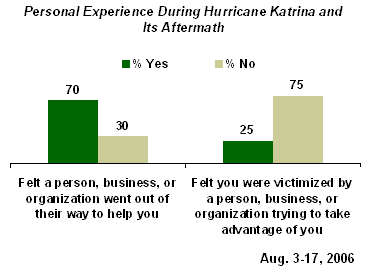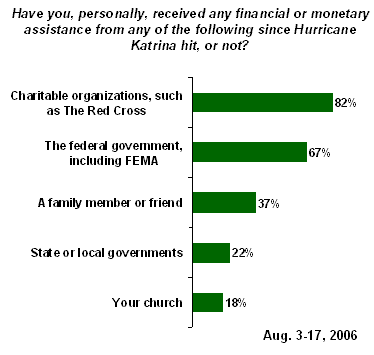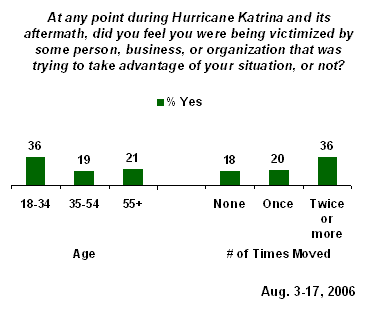GALLUP NEWS SERVICE
PRINCETON, NJ -- Stories of inflated prices for hotel rooms, gasoline, building supplies, and contractor work are standard fare when it comes to news coverage of natural disasters. The reality that there are predators seeking to profit at the expense of those forced to evacuate or repair their homes is bound to be a worry for disaster victims. At the same time, there are scores of examples of charities, volunteers, and individuals that step forward to lend a hand.
A recent USA Today/Gallup poll of Hurricane Katrina survivors helps quantify what is otherwise anecdotal information about such experiences. In the case of this disaster, it appears that the balance sheet on human behavior is quite positive. Many more survivors say they were helped by people, businesses, or organizations that went out of their way to improve survivors' situations (70%) than say they ever felt victimized by someone trying to take advantage of their circumstances (25%).

The survey is not representative of all victims of Hurricane Katrina, but of those who applied to the American Red Cross for disaster relief -- presumably the most needy of all survivors. In cooperation with that organization, Gallup conducted an initial survey of this population last fall, reaching 1,510 survivors via land line and cell phone. The current survey is a follow-up with 602 of those respondents whom Gallup was able to recontact.
The Good
As noted, 70% of those surveyed Aug. 3-17, 2006, say they benefited during Hurricane Katrina or its aftermath from someone going out of his or her way to help them. There are no major differences in responses to this according to the gender, race, age, or income of the respondent. However, those who report having had to move twice or more as a result of the hurricane are slightly more likely to say they were helped than are those who did not have to move (77% vs. 64%).
While help could come in many forms, Gallup polling makes clear that Katrina victims were and continue to be most in need of financial assistance. Last fall, more than 6 in 10 respondents told Gallup that what they most needed to recover from Katrina was either direct financial support or various supplies (such as clothes, a car, and household supplies) that a person primarily requires money to obtain. Today, the percentage of respondents citing cash or supplies as their main need is still over 50%.
When asked what groups or entities have provided them with financial assistance, large numbers cite the official agencies responsible for providing this kind of aid: 82% name charitable organizations such as the Red Cross and 67% name the federal government (including FEMA). Family and friends rank a distant third, with 37% reporting financial aid from these groups, followed by state or local governments (22%). Eighteen percent say they received monetary assistance from their churches.

While the number of respondents citing their churches as sources of financial aid is relatively small, those in this group are especially likely to say they benefited from a person or group going out of their way to help them: 92%, compared with 74% to 80% of those receiving assistance from other sources.
The Bad
One-quarter of the survivors polled say that at some point during Hurricane Katrina and its aftermath, they felt victimized by a person or entity trying to take advantage of their situation. While there is no difference in responses to this according to gender or race, younger adults are much more likely to perceive having been victimized than are older adults. Also, those who had to move multiple times were more exposed to this than were those who did not have to move.

When respondents who reported being victimized were asked to identify the perpetrator, several of the usual suspects were named: contractors, gas stations, insurance companies, landlords, merchants, and hotels. However, a relatively large number -- 15% -- also mentioned FEMA or the government.
|
What type of organization, business, or person |
|
|
% |
|
|
Contractors |
20 |
|
FEMA/Government |
15 |
|
Gas companies/stations |
14 |
|
Insurance companies |
10 |
|
Apartment managers/Landlords |
7 |
|
Merchants/Local stores |
7 |
|
Financial institutions |
5 |
|
Hotels |
5 |
|
Neighbors/People around us |
3 |
|
Employers |
3 |
|
Red Cross |
2 |
|
Other |
23 |
|
Note: Percentages add to more than 100% due to multiple responses. |
|
The Combined Picture
When combining responses to both questions -- whether one benefited and whether one was victimized -- Gallup finds that a slim majority of Katrina survivors (52%) feel they benefited from the extraordinary help of some person or organization and were never victimized. Only 7% are in the reverse situation, saying they were only victimized and never helped. Eighteen percent say they had both experiences, while 23% say they had neither.
Survey Methods
Results are based on telephone interviews conducted Aug. 3-17, 2006, with a sample of 602 adults, aged 18 and older, who participated in a Gallup survey of Hurricane Katrina victims last year.
The initial sample of 1,510 adults was drawn randomly from the American Red Cross database of applicants seeking assistance due to the effects of Hurricane Katrina. The vast majority of applicants provided a working contact telephone number to the Red Cross. Gallup did reverse phone lookups to obtain telephone numbers for the portion of the selected sample that did not provide contact numbers. Where necessary, Gallup interviewers tracked down updated telephone numbers when respondents had moved from their previous locations. Interviews were conducted on both land line and cellular telephones.
In the follow-up survey, Gallup interviewers were able to successfully contact the household where the respondent was now living in 767 out of 1510 cases, and to complete interviews with 602 of last year's respondents.
Trend data are reported for those successfully recontacted in Wave 2, as well as for all 1,510 Wave 1 respondents. Direct comparisons between last year's and this year's results should be done only among those recontacted in Wave 2.
In addition to sampling error, question wording and practical difficulties in conducting surveys can introduce error or bias into the findings of public opinion polls.
22. At any point during Hurricane Katrina and its aftermath, were you helped by some person, business or organization that you felt went out of their way to improve your situation, or not?
|
|
Yes |
No |
No opinion |
|
2006 Aug 3-17 |
70% |
30 |
* |
|
* Less than 0.5% |
|||
23. At any point during Hurricane Katrina and its aftermath, did you feel you were being victimized by some person, business or organization that was trying to take advantage of your situation, or not?
|
|
Yes |
No |
No opinion |
|
2006 Aug 3-17 |
25% |
75 |
* |
|
* Less than 0.5% |
|||
24. What type of organization, business, or person took advantage of your situation? (OPEN-ENDED)
BASED ON 147 RESPONDENTS WHO FELT VICTIMIZED BY SOMEONE AFTER HURRICANE KATRINA
|
|
2006 Aug 3-17 |
|
% |
|
|
Contractors |
20 |
|
FEMA/Government |
15 |
|
Gas companies/stations |
14 |
|
Insurance companies |
10 |
|
Apartment managers/Landlords |
7 |
|
Merchants/Local stores |
7 |
|
Financial institutions |
5 |
|
Hotels |
5 |
|
Neighbors/People around us |
3 |
|
Employers |
3 |
|
Red Cross |
2 |
|
|
|
|
Other |
23 |
|
No opinion |
1 |
|
Note: Percentages add to more than 100% due to multiple responses. |
|
25. Have you, personally, received any financial or monetary assistance from any of the following since Hurricane Katrina hit, or not? How about -- [RANDOM ORDER]?
|
2006 Aug 3-17 |
Yes |
No |
No |
|
% |
% |
% |
|
|
Charitable organizations, such as The Red Cross |
82 |
17 |
1 |
|
The federal government, including FEMA |
67 |
33 |
* |
|
A family member or friend |
37 |
63 |
* |
|
State or local governments |
22 |
77 |
1 |
|
Your church |
18 |
82 |
-- |
|
* Less than 0.5% |
|||
